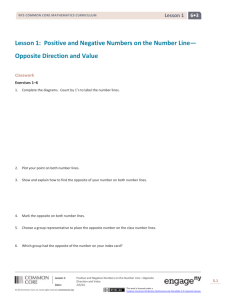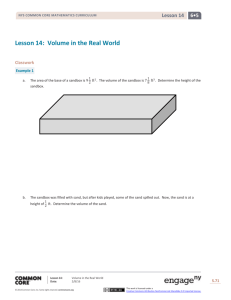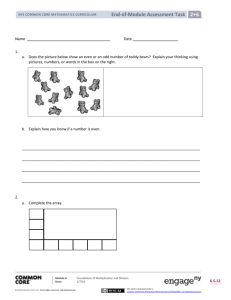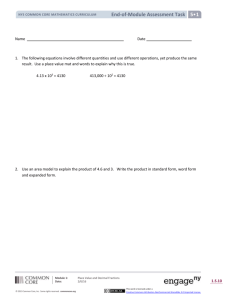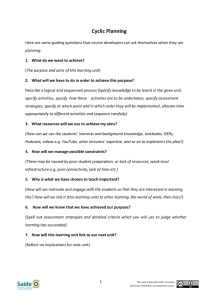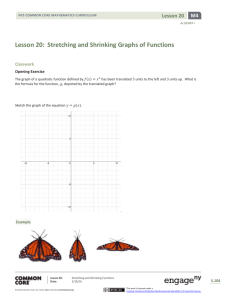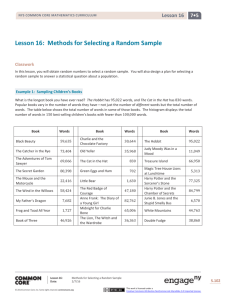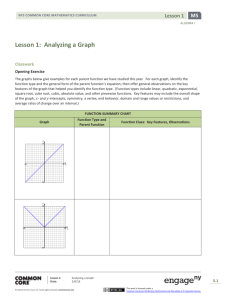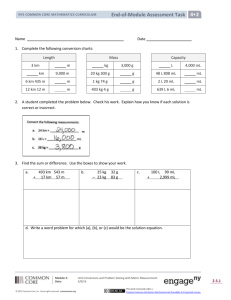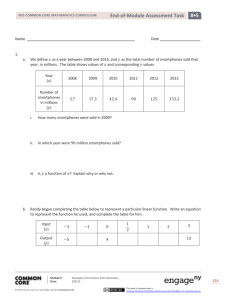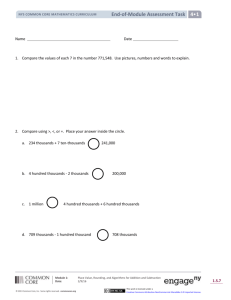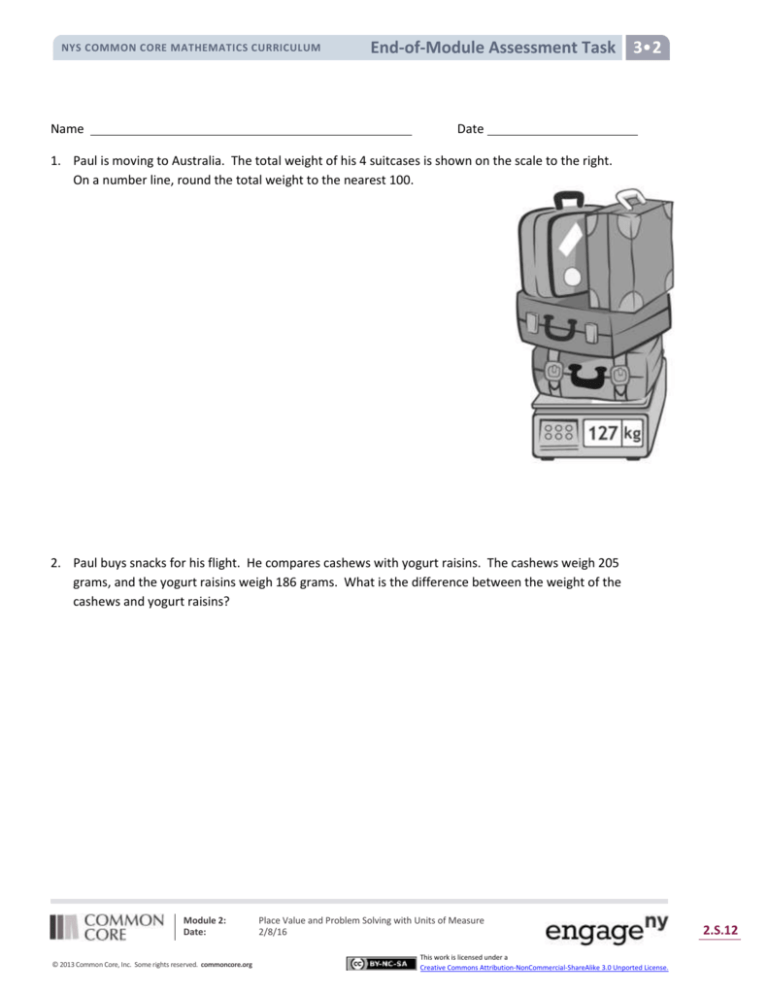
NYS COMMON CORE MATHEMATICS CURRICULUM
Name
3•2
End-of-Module Assessment Task Lesson
2•3
Date
1. Paul is moving to Australia. The total weight of his 4 suitcases is shown on the scale to the right.
On a number line, round the total weight to the nearest 100.
2. Paul buys snacks for his flight. He compares cashews with yogurt raisins. The cashews weigh 205
grams, and the yogurt raisins weigh 186 grams. What is the difference between the weight of the
cashews and yogurt raisins?
Module 2:
Date:
© 2013 Common Core, Inc. Some rights reserved. commoncore.org
Place Value and Problem Solving with Units of Measure
2/8/16
This work is licensed under a
Creative Commons Attribution-NonCommercial-ShareAlike 3.0 Unported License.
2.S.12
NYS COMMON CORE MATHEMATICS CURRICULUM
3•2
End-of-Module Assessment Task Lesson
2•3
3. The clock to the right shows what time it is now.
a. Estimate the time to the nearest 10 minutes.
Time right now:
b. The clock to the right show Paul’s departure
time. Estimate the time to the nearest 10
minutes.
Departure time:
c. Use your answers from Parts (a) and (b) to estimate how long Paul has before his flight leaves.
Module 2:
Date:
© 2013 Common Core, Inc. Some rights reserved. commoncore.org
Place Value and Problem Solving with Units of Measure
2/8/16
This work is licensed under a
Creative Commons Attribution-NonCommercial-ShareAlike 3.0 Unported License.
2.S.13
NYS COMMON CORE MATHEMATICS CURRICULUM
3•2
End-of-Module Assessment Task Lesson
2•3
4. A large airplane uses about 256 liters of fuel every minute.
a. Round to the nearest ten to estimate how many liters of fuel get used every minute.
b. Use your estimate to find about how many liters of fuel are used every 2 minutes.
c. Calculate precisely how much fuel is used in 2 minutes.
d. Draw a tape diagram to find the difference between your estimate and precise calculation.
Module 2:
Date:
© 2013 Common Core, Inc. Some rights reserved. commoncore.org
Place Value and Problem Solving with Units of Measure
2/8/16
This work is licensed under a
Creative Commons Attribution-NonCommercial-ShareAlike 3.0 Unported License.
2.S.14
NYS COMMON CORE MATHEMATICS CURRICULUM
3•2
End-of-Module Assessment Task Lesson
2•3
5. Baggage handlers lift heavy luggage into the plane. The weight of one bag is
shown on the scale to the right.
a. One baggage handler lifts 3 bags of the same weight. Round to
estimate the total weight he lifts. Then, calculate exactly.
b. Another baggage handler lifts luggage that weighs a total of 200 kilograms. Write and solve an
equation to show how much more weight he lifts than the first handler in Part (a).
c. They load luggage for 18 minutes. If they start at 10:25 p.m., what time do they finish?
d. The baggage handler drinks the amount of water shown below every day at work. How many liters of
water does he drink during all 7 days of the week?
Module 2:
Date:
© 2013 Common Core, Inc. Some rights reserved. commoncore.org
Place Value and Problem Solving with Units of Measure
2/8/16
This work is licensed under a
Creative Commons Attribution-NonCommercial-ShareAlike 3.0 Unported License.
2.S.15
NYS COMMON CORE MATHEMATICS CURRICULUM
3•2
End-of-Module Assessment Task Lesson
2•3
6. Complete as many problems as you can in 100 seconds. The teacher will time you and tell you when to
stop.
Module 2:
Date:
© 2013 Common Core, Inc. Some rights reserved. commoncore.org
Place Value and Problem Solving with Units of Measure
2/8/16
This work is licensed under a
Creative Commons Attribution-NonCommercial-ShareAlike 3.0 Unported License.
2.S.16
NYS COMMON CORE MATHEMATICS CURRICULUM
3•2
End-of-Module Assessment Task Lesson
2•3
End-of-Module Assessment Task
Standards Addressed
Topics A–F
Use place value understanding and properties of operations to perform multi-digit arithmetic. (A range
of algorithms may be used.)
3.NBT.1
Use place value understanding to round whole numbers to the nearest 10 or 100.
3.NBT.2
Fluently add and subtract within 1000 using strategies and algorithms based on place
value, properties of operations, and/or the relationship between addition and subtraction.
Solve problems involving measurement and estimation of intervals of time, liquid volumes, and masses
of objects.
3.MD.1
Tell and write time to the nearest minute and measure time intervals in minutes. Solve
word problems involving addition and subtraction of time intervals in minutes, e.g., by
representing the problem on a number line diagram.
3.MD.2
Measure and estimate liquid volumes and masses of objects using standard units of grams
(g), kilograms (kg), and liters (l). (Excludes compound units such as cm3 and finding the
geometric volume of a container.) Add, subtract, multiply, or divide to solve one-step word
problems involving masses or volumes that are given in the same units, e.g., by using
drawings (such as a beaker with a measurement scale) to represent the problem. (Excludes
multiplicative comparison problems, i.e., problems involving notions of “times as many”;
see Glossary, Table 2.)
Multiply and divide within 100.
3.OA.7
Fluently multiply and divide within 100, using strategies such as the relationship between
multiplication and division (e.g., knowing that 8 x 5 = 40, one knows 40 ÷ 5 = 8) or
properties of operations. By the end of Grade 3, know from memory all products of two
one-digit numbers.
Evaluating Student Learning Outcomes
A Progression Toward Mastery is provided to describe steps that illuminate the gradually increasing
understandings that students develop on their way to proficiency. In this chart, this progress is presented
from left (Step 1) to right (Step 4) for Problems 1–5. The learning goal for each student is to achieve Step 4
mastery. These steps are meant to help teachers and students identify and celebrate what the student CAN
do now, and what they need to work on next. Problem 6 is scored differently since it is a timed assessment of
fluency. Students complete as many problems as they can in 100 seconds. Although this page of the
assessment contains 40 questions, answering 30 correct within the time limit is considered passing.
Module 2:
Date:
© 2013 Common Core, Inc. Some rights reserved. commoncore.org
Place Value and Problem Solving with Units of Measure
2/8/16
This work is licensed under a
Creative Commons Attribution-NonCommercial-ShareAlike 3.0 Unported License.
2.S.17
NYS COMMON CORE MATHEMATICS CURRICULUM
3•2
End-of-Module Assessment Task Lesson
2•3
A Progression Toward Mastery
Assessment
Task Item
1
3.NBT.1
3.MD.2
2
3.NBT.2
3
3.NBT.1
3.NBT.2
3.MD.1
STEP 1
Little evidence of
reasoning without
a correct answer.
STEP 2
Evidence of some
reasoning without
a correct answer.
(1 Point)
(2 Points)
Student is unable to
answer any question
correctly. The attempt
shows the student may
not understand the
meaning of the
questions.
Student may or may not
answer questions
correctly. Mistakes
may include those listed
in the box to the right,
and/or
Student is unable to
answer any question
correctly. The attempt
shows the student may
not understand the
meaning of the
questions.
Mistakes may include
those listed in the box
to the right, and/or:
Student is unable to
answer questions
correctly. The attempt
shows the student may
not understand the
meaning of the
questions.
Student attempts to
answer the questions.
Mistakes may include
those listed in the box
to the right, and/or:
Module 2:
Date:
© 2013 Common Core, Inc. Some rights reserved. commoncore.org
STEP 3
Evidence of some
reasoning with a
correct answer or
evidence of solid
reasoning with an
incorrect answer.
(3 Points)
STEP 4
Evidence of solid
reasoning with a
correct answer.
Same criteria as for a 4,
but may omit the unit
(kg) in one or more
parts of the answer.
Student answers every
question correctly:
Inaccurately reading
one or both of the
clocks.
Accurately reads the
scale as 127 kg.
Rounds on a number
line to estimate
100 kg.
Misreading a scale,
but correctly
rounding based on
error.
Decomposing the
numbers incorrectly.
(4 Points)
Student may or may not
answer questions
correctly. Mistakes
may include:
Student correctly:
Writes and solves
205 g – 186 g = 19 g.
Decomposing the
numbers correctly
but making a
calculation error
when subtracting.
Student answers at
least one question
correctly. Mistakes
may include:
Student answers every
question correctly:
Rounding error in
either Part (a) or (b)
affecting Part (c), but
solves correctly
based on wrong
answer.
b) Rounds 10:53 to
10:50.
a) Rounds 10:19 to
10:20.
c) Estimates about 30
minutes before the
plane leaves
(possible equation
50 minutes – 20
minutes = 30
minutes).
Place Value and Problem Solving with Units of Measure
2/8/16
This work is licensed under a
Creative Commons Attribution-NonCommercial-ShareAlike 3.0 Unported License.
2.S.18
NYS COMMON CORE MATHEMATICS CURRICULUM
3•2
End-of-Module Assessment Task Lesson
2•3
A Progression Toward Mastery
4
3.NBT.1
3.NBT.2
Student is unable to
answer either question
correctly. The attempt
shows the student may
not understand the
meaning of the
questions.
Student attempts to
answer the questions.
Mistakes may include
those listed in the box
to the right, and/or:
Either failing to
round or calculate
exactly in Parts (a–d).
Omitting the units in
any part.
Student may or may not
answer questions
correctly. Mistakes
may include:
Student answers every
question correctly:
Arithmetic error in
Part (c) affecting Part
(d), but draws and
labels tape diagram
correctly based on
wrong answer.
Estimates 520 liters
in Part (b).
Student may or may not
answer questions
correctly. Mistakes
may include:
Student answers every
question correctly:
Arithmetic error in
Part (a) affecting Part
(b), but solved
correctly based on
wrong answer.
Rounds to estimate
70kg in Part (a).
Incorrectly drawing
or labelling a tape
diagram.
5
3.NBT.1
3.NBT.2
3.MD.1
3.MD.2
Student is unable to
answer any question
correctly. The attempt
shows the student may
not understand the
meaning of the
questions.
Student attempts to
answer the questions.
Mistakes may include
those listed in the box
to the right, and/or:
Conceptual rather
than calculation error
in Parts (a), (b), or
(d).
Either fails to round
or calculate exactly in
Part (a).
Failure to write an
equation in Part (b).
Omits the units in
any part.
Rounds to estimate
260 liters in Part (a).
Precisely calculates
512 liters in Part (c).
Draws and labels a
tape diagram to
show 8 liters as the
difference in Part (d).
Reads 65 kg on the
scale in Part (a).
65 + 65 + 65 = 195
kg, and 70 + 70 + 70
= 210 kg in Part (a).
Writes and solves
200 – 195 = 5 kg in
Part (b).
Calculates end time
of 10:43 p.m. in Part
(c).
May use
multiplication or
addition to answer
28 liters in Part (d).
6
3.OA.7
Use the attached sample work to correct students’ answers on the fluency page of the assessment.
Students who answer 30 or more questions correctly within the allotted time pass this portion of the
assessment. They are ready to move on to the more complicated fluency page given with the Module 3
End-of-Module Assessment. For students who do not pass, you may choose to re-administer this fluency
page with each subsequent end-of-module assessment until they are successful.
Analyze the mistakes students make on this assessment to further guide your fluency instruction.
Possible questions to ask as you analyze are given below:
Did this student struggle with multiplication, division, or both?
Did this student struggle with a particular factor?
Did the student consistently miss problems with the unknown in a particular position?
Module 2:
Date:
© 2013 Common Core, Inc. Some rights reserved. commoncore.org
Place Value and Problem Solving with Units of Measure
2/8/16
This work is licensed under a
Creative Commons Attribution-NonCommercial-ShareAlike 3.0 Unported License.
2.S.19
NYS COMMON CORE MATHEMATICS CURRICULUM
Module 2:
Date:
© 2013 Common Core, Inc. Some rights reserved. commoncore.org
3•2
End-of-Module Assessment Task Lesson
2•3
Place Value and Problem Solving with Units of Measure
2/8/16
This work is licensed under a
Creative Commons Attribution-NonCommercial-ShareAlike 3.0 Unported License.
2.S.20
NYS COMMON CORE MATHEMATICS CURRICULUM
Module 2:
Date:
© 2013 Common Core, Inc. Some rights reserved. commoncore.org
3•2
End-of-Module Assessment Task Lesson
2•3
Place Value and Problem Solving with Units of Measure
2/8/16
This work is licensed under a
Creative Commons Attribution-NonCommercial-ShareAlike 3.0 Unported License.
2.S.21
NYS COMMON CORE MATHEMATICS CURRICULUM
Module 2:
Date:
© 2013 Common Core, Inc. Some rights reserved. commoncore.org
3•2
End-of-Module Assessment Task Lesson
2•3
Place Value and Problem Solving with Units of Measure
2/8/16
This work is licensed under a
Creative Commons Attribution-NonCommercial-ShareAlike 3.0 Unported License.
2.S.22
NYS COMMON CORE MATHEMATICS CURRICULUM
Module 2:
Date:
© 2013 Common Core, Inc. Some rights reserved. commoncore.org
3•2
End-of-Module Assessment Task Lesson
2•3
Place Value and Problem Solving with Units of Measure
2/8/16
This work is licensed under a
Creative Commons Attribution-NonCommercial-ShareAlike 3.0 Unported License.
2.S.23
NYS COMMON CORE MATHEMATICS CURRICULUM
Module 2:
Date:
© 2013 Common Core, Inc. Some rights reserved. commoncore.org
3•2
End-of-Module Assessment Task Lesson
2•3
Place Value and Problem Solving with Units of Measure
2/8/16
This work is licensed under a
Creative Commons Attribution-NonCommercial-ShareAlike 3.0 Unported License.
2.S.24

